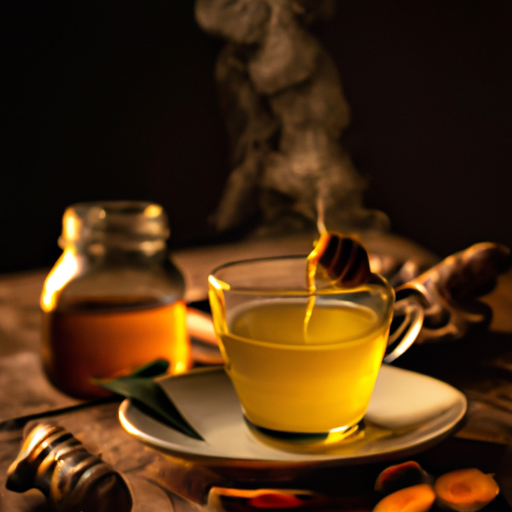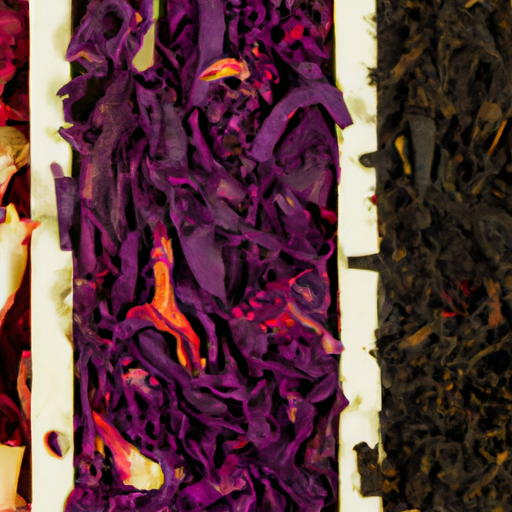While enjoying a cozy mug of turmeric tea, I am filled with gratitude for the numerous advantages that this golden spice provides.
Turmeric has been used for centuries in Ayurvedic medicine and is known for its anti-inflammatory properties, making it a popular ingredient in many health-conscious recipes.
But today, I want to share with you my favorite way to incorporate turmeric into my daily routine – through a delicious and easy-to-make cup of turmeric tea.
Not only does turmeric tea provide numerous health benefits, but it also offers a comforting and soothing experience that can be enjoyed any time of day.
Whether you’re looking to boost your immune system or simply unwind after a long day, this recipe is sure to become a staple in your kitchen.
So grab your favorite mug and let’s get started!
Key Takeaways
- Turmeric tea is a popular and comforting way to incorporate the anti-inflammatory properties of turmeric into daily routine.
- Turmeric tea offers numerous health benefits, including boosting immunity, aiding digestion, fighting infections, easing joint pain, and preventing chronic diseases.
- Turmeric tea can be made with fresh or ground turmeric, honey, lemon juice, water, and other spices like ginger and cinnamon.
- Precautions should be taken when consuming turmeric, as excessive consumption may lead to possible side effects and it can interact with some medications. Pregnant women should consult with a healthcare provider before consuming turmeric tea.
Benefits of Turmeric Tea
You’ll love how turmeric tea can boost your immune system, reduce inflammation, and improve digestion. Not only does it taste delicious, but it also has numerous health benefits that make it a great addition to your daily routine.
Turmeric tea recipes have been used for centuries in traditional medicine to treat a variety of ailments and promote overall wellness.
Some of the most notable turmeric tea benefits include its ability to fight off infections, ease joint pain and stiffness, and aid in digestion. It’s also known for its anti-inflammatory properties, which can help prevent chronic diseases such as heart disease and cancer.
So if you’re looking for a natural way to stay healthy and feel your best, adding turmeric tea to your diet is definitely worth considering. Now let’s take a look at what ingredients you’ll need to make this delicious beverage!
Ingredients Needed to Make Turmeric Tea
To prepare this healthy beverage, simply gather the necessary ingredients. For a basic turmeric tea recipe, you’ll need fresh or ground turmeric, honey or any natural sweetener of your choice, lemon juice, and water. You can also add in other ingredients such as ginger root or black pepper to enhance the flavor and health benefits.
Turmeric is well-known for its potent anti-inflammatory properties that can help reduce inflammation throughout the body. It’s been used for centuries in traditional medicine and culinary uses. Adding turmeric to your diet through drinking turmeric tea is an easy way to reap its health benefits while enjoying a warm, comforting drink.
Now let’s move on to step-by-step instructions for making turmeric tea.
Step-by-Step Instructions for Making Turmeric Tea
I love making turmeric tea at home because it’s a delicious and healthy way to start my day.
To make this delightful brew, I begin by boiling water in a small pot on the stove. Next, I add turmeric powder along with other spices like ginger and cinnamon to infuse the water with flavor.
Once everything is mixed together, I let the mixture simmer for a few minutes before straining it and serving it hot.
Boiling Water
When the water starts to boil, I add a teaspoon of turmeric powder to the pot. Boiling water is an essential step in making any tea because it helps extract the flavor and aroma from the ingredients and sanitizes the water, killing any bacteria or germs that may be present.
Here are some tips for boiling water:
- Use filtered or purified water if possible for better taste.
- Boil water in a stainless steel or glass pot to avoid chemical reactions with other metals.
- Bring the water to a rolling boil but avoid boiling it for too long as it can make the tea taste flat.
Different types of tea can be made using boiling water, such as black tea, green tea, herbal tea, and now turmeric tea! Adding spices like ginger and cinnamon not only enhances flavor but also has many health benefits.
So let’s move on to adding turmeric and other spices to our boiling hot pot of water!
Adding Turmeric and Other Spices
Spice up your boiling water with a teaspoon of turmeric powder and other flavorful spices to create a delicious and healthy beverage. Turmeric has been used in cooking for centuries, providing dishes with its distinctive yellow color and warm, slightly bitter flavor. But did you know that turmeric also has numerous health benefits? It contains curcumin, a compound known for its anti-inflammatory properties, making it beneficial for reducing inflammation in the body.
To enhance the flavor and health benefits of your turmeric tea, consider adding other spices such as ginger, cinnamon, or black pepper. These ingredients not only add depth to the flavor profile but also have their own unique health benefits. For example, ginger is known for aiding digestion while cinnamon can help regulate blood sugar levels. Check out this table below to learn more about how these spices can benefit your health:
| Spice | Health Benefit |
|---|---|
| Turmeric | Anti-inflammatory |
| Ginger | Digestive aid |
| Cinnamon | Regulates blood sugar levels |
| Black Pepper | Enhances absorption of curcumin |
Now that we have added our turmeric powder and other spices to the boiling water, it’s time to let the mixture simmer and infuse all those wonderful flavors together.
Simmering the Mixture
As the mixture simmers, the flavors meld together like a symphony of tastes and aromas. The heat from the stove brings out the full potential of the spices, creating a warm and comforting sensation that spreads throughout my body.
Simmering techniques play an essential role in making turmeric tea because it allows for all of the ingredients to fully infuse into one another. To enhance the flavor profile of turmeric tea, I like to experiment with different flavors.
Some days, I’ll add in a slice of fresh ginger or a pinch of black pepper for a little bit of spice. Other times, I’ll throw in some cinnamon sticks or cardamom pods for a sweeter taste. The possibilities are endless when it comes to making turmeric tea!
Once the mixture has simmered enough time to extract all of its goodness, it’s time to move onto straining and serving this delicious drink.
Straining and Serving
Now that you’ve let the mixture simmer and all the flavors have melded together, it’s time to strain out any remaining bits and pour your aromatic creation into a cup, allowing yourself to indulge in its warm and comforting taste.
To do this, you’ll need a fine mesh strainer or cheesecloth to remove any chunks of ginger or turmeric root that may be left behind. Gently pour the tea through the strainer or wrap the cheesecloth around the mixture and squeeze out all of the liquid. This will ensure that your turmeric tea is smooth and ready to drink.
As you finish pouring your turmeric tea into a cup, consider ways to minimize waste and reuse any leftover tea leaves. One strategy is to compost them for later use as fertilizer in your garden. Another option is to add them to soups or stews for an extra boost of flavor.
With these ideas in mind, take a sip of your freshly brewed turmeric tea and enjoy its soothing properties before moving on to learn about tips for enhancing its flavor even further.
Tips for Enhancing the Flavor of Turmeric Tea
To really make your turmeric tea pop, you gotta add a squeeze of lemon and a dash of honey – it’s the icing on the cake!
Not only do these two ingredients enhance the flavor of the tea, but they also provide additional health benefits. Lemon is packed with vitamin C and antioxidants while honey has antibacterial properties and can soothe a sore throat.
If you’re feeling adventurous, try adding other herbs or spices to your turmeric tea. Ginger is a great addition that complements the earthy taste of turmeric, while cinnamon adds warmth and sweetness.
For those who prefer a creamier texture, adding milk or coconut milk can create a delicious latte-like beverage. And don’t forget about serving options – turmeric tea can be enjoyed hot or iced, with lemon or honey or both!
Now that we’ve enhanced the flavor of our turmeric tea, let’s talk about how much we should drink to reap its benefits.
How Much Turmeric Tea to Drink
Now that we know how to make a delicious cup of turmeric tea, let’s talk about how much we should be drinking.
As someone who loves the taste and health benefits of this golden elixir, I’ve done my fair share of research on the topic.
It’s important to keep in mind both recommended daily intake and possible side effects when incorporating turmeric tea into our daily routine.
Recommended Daily Intake
If you’re looking to incorporate turmeric tea into your daily routine, you’ll be happy to know that experts recommend consuming up to 500 milligrams of curcumin per day. This can easily be achieved by drinking two cups of turmeric tea daily.
In fact, studies have shown that drinking turmeric tea has many benefits over taking turmeric supplements in capsule form. Turmeric tea is a natural and effective way to reduce inflammation in the body, boost immunity, and improve brain function. It also contains antioxidants that can prevent cell damage and lower the risk of chronic diseases such as cancer and Alzheimer’s.
So if you want to reap the full benefits of this ancient spice, consider adding turmeric tea to your daily routine. However, it’s important to note that excessive consumption may lead to possible side effects such as stomach upset or diarrhea.
Possible Side Effects
Be aware of possible side effects from drinking too much turmeric tea, as it may cause stomach upset or diarrhea. While turmeric is generally safe to consume, excessive intake may lead to adverse reactions. It is important to note that these side effects are rare and usually occur when consuming high doses of turmeric supplements.
Additionally, if you are taking medication for certain health conditions like diabetes or blood thinners, it’s essential to consult with your healthcare provider before adding turmeric to your diet. Turmeric can interact with some medications and increase the risk of bleeding in some cases. Therefore, always talk with your doctor before making any significant changes in your diet or supplement regimen.
When incorporating turmeric into your diet, there are other ways besides drinking tea that you can consider. One example is adding turmeric powder to dishes like curries or smoothies for an extra dose of flavor and nutrition.
Other Ways to Incorporate Turmeric into Your Diet
To incorporate more turmeric into your diet, you can sprinkle it on roasted vegetables or add it to your smoothies for an extra boost of antioxidants. Personally, I love adding a teaspoon of turmeric to my morning smoothie along with some frozen berries and almond milk. It gives my smoothie a beautiful golden hue and adds a slightly spicy flavor that pairs perfectly with the sweetness of the fruit.
If you’re feeling adventurous, try making a turmeric latte by combining coconut milk, honey, ginger, cinnamon, and turmeric in a small saucepan over low heat. Bring it to a simmer while stirring occasionally until everything is well combined. Serve it hot and enjoy! Just be careful not to spill because this vibrant yellow beverage stains anything it touches.
Now let’s move onto health precautions and warnings before we dive deeper into the benefits of consuming turmeric regularly.
Health Precautions and Warnings
I’m sure you’re eager to incorporate turmeric tea into your daily routine, but before you start sipping away, it’s important to consider some health precautions and warnings.
One common question is how often can I drink turmeric tea? While there’s no set limit, drinking too much could lead to digestive issues or even liver damage.
Another concern is whether children can drink turmeric tea. It’s generally safe for kids but should be consumed in moderation and only after consulting with a pediatrician.
Lastly, pregnant women may wonder if they can partake in this beverage. In small amounts, it’s usually safe but larger doses could cause contractions or even miscarriage so consult with your doctor before indulging.
How Often Can I Drink Turmeric Tea?
Turmeric tea is a tasty and healthy beverage that can be enjoyed daily without any adverse effects. In fact, drinking turmeric tea regularly can provide numerous benefits to our health. Turmeric contains curcumin, which has anti-inflammatory and antioxidant properties that can help improve digestion, boost immunity, and reduce the risk of chronic diseases such as cancer and Alzheimer’s.
Additionally, turmeric tea can also promote healthy skin and alleviate symptoms of depression. When it comes to frequency of consumption, it’s generally safe to drink turmeric tea once or twice a day. However, it’s important to note that excessive consumption may lead to certain side effects such as nausea or diarrhea. It’s recommended that you consult with your healthcare provider before incorporating turmeric tea into your daily routine if you have any underlying medical conditions or are taking medications.
So how about children? Can they also enjoy the benefits of turmeric tea? Let’s explore this topic in the next section.
Can Children Drink Turmeric Tea?
You may be wondering if your little ones can reap the benefits of turmeric tea by adding a dash of it to their favorite warm drink. While turmeric tea benefits are numerous, there are age restrictions for consumption. Here’s what you need to know before giving turmeric tea to children:
- Turmeric is safe for most children when consumed in small amounts.
- However, large doses of turmeric may cause digestive issues or allergic reactions.
- It’s important to consult with your child’s pediatrician before giving them any supplements or herbs, including turmeric.
- If your child experiences any adverse effects after consuming turmeric tea, stop the consumption immediately and seek medical attention.
Overall, while there are potential health benefits of drinking turmeric tea for both adults and children, it’s important to approach this herbal supplement with caution.
Now let’s discuss whether pregnant women can drink turmeric tea.
Can Pregnant Women Drink Turmeric Tea?
Expecting mothers can enjoy the potential benefits of a warm, comforting beverage that incorporates this vibrant golden spice. Turmeric tea is generally considered safe during pregnancy when consumed in moderation. However, as with all dietary changes during pregnancy, it’s important to consult with a healthcare provider before adding turmeric tea to your regular routine.
Turmeric has been shown to have anti-inflammatory properties and may help boost the immune system. Additionally, some studies suggest that it may help alleviate symptoms associated with morning sickness and gestational diabetes. As always, pregnant women should be cautious when introducing any new food or drink into their diet and pay attention to any adverse reactions they may experience.
When looking for sources and references about the safety of turmeric tea during pregnancy, it’s important to turn to trusted medical resources such as your doctor or midwife. They can provide personalized advice based on your individual health history and any potential risks associated with consuming turmeric tea while pregnant.
Sources and References
Looking for reliable sources to learn more about the health benefits of turmeric? Check out these references!
Here are some great sources that can give you a better understanding of how this amazing spice can help improve your overall health and wellbeing:
-
The National Center for Complementary and Integrative Health provides an in-depth look into the potential benefits of turmeric supplements, including its anti-inflammatory properties and ability to reduce pain.
-
A study published in the Journal of Medicinal Food discusses the antioxidant effects of turmeric tea, as well as its potential to lower cholesterol levels and promote healthy digestion.
-
Traditional Chinese Medicine uses turmeric as a natural remedy for ailments like arthritis, depression, and digestive issues. You can find a wealth of information about these ancient healing practices from reputable sources like the Pacific College of Oriental Medicine.
-
Looking for some delicious turmeric tea recipes from different cultures? Check out blogs like The Spruce Eats or Tea Perspective for creative ways to incorporate this spice into your daily routine.
With so much information available on the internet, it’s important to turn to reliable sources when learning about new foods and their benefits. By using these resources as a starting point, you’ll be able to discover all the amazing things that turmeric has to offer!
Frequently Asked Questions
Is it safe to consume turmeric tea while pregnant?
As a pregnant woman, I wondered if consuming turmeric tea is safe. According to research, drinking moderate amounts of turmeric tea during pregnancy is generally considered safe. However, it’s important to consult with your doctor about any potential risks or benefits.
Can turmeric tea help with weight loss?
Turmeric tea can aid weight loss by boosting metabolism and reducing inflammation. The benefits of turmeric tea include improved digestion, reduced stress, and increased immunity. Recommended dosage is one to two cups per day.
Can turmeric tea be made with fresh turmeric root instead of powder?
Yes, I prefer to use fresh turmeric root when making turmeric tea. It has a more intense flavor and contains higher levels of curcumin, which offers anti-inflammatory benefits. Powdered turmeric can be used as well, but fresh is my go-to.
Can turmeric tea be consumed cold or does it have to be hot?
Oh, sure, you can absolutely drink turmeric tea cold. Nothing beats a refreshing glass of chilled turmeric tea on a hot day. And don’t forget the different variations – add some honey or lemon for an extra kick!
How often should turmeric tea be consumed for maximum health benefits?
I recommend drinking turmeric tea daily for optimal health benefits. Frequency of consumption is key, as the curcumin in turmeric has anti-inflammatory and antioxidant properties that can help with a range of health issues.
Conclusion
In conclusion, making turmeric tea is a simple and enjoyable way to incorporate this beneficial spice into your daily routine. I remember the first time I tried turmeric tea, skeptical of its earthy flavor, but I was pleasantly surprised by its warm and comforting taste.
Since then, it has become a staple in my diet and has provided me with numerous health benefits. One metaphor that comes to mind when thinking about the effects of turmeric on the body is that of a superhero cape. Turmeric acts as a powerful antioxidant and anti-inflammatory agent, like a cape protecting our cells from damage caused by free radicals and inflammation.
It also aids in digestion, boosts immunity, and promotes heart health. Adding just one cup of turmeric tea to your day can make you feel like a superhero fighting off harmful invaders within your body.
Overall, incorporating turmeric into your diet through tea or other dishes can have significant health benefits. So, grab your cape (or teacup) and start reaping the rewards that this golden spice has to offer!










